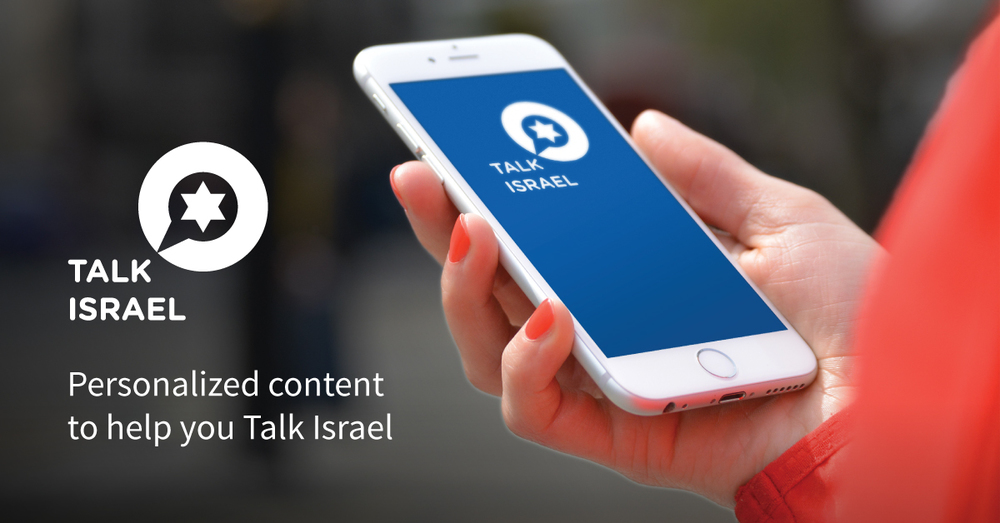By Jacob Kamaras/JNS.org
Israel news is abound these days, and myriad sources from the mainstream to the niche are serving it up—particularly during times like the current wave of Palestinian terrorism. But which content should a pro-Israel advocate read, trust, and share with others to make an impact?
The recently launched Talk Israel mobile app seeks to give a well-organized and personalized feel to Israel news consumers’ content experience. Calling itself the “first mobile app to bring you pro-Israel digital content from dozens of sources tailored to your personal preferences and interests using machine learning,” Talk Israel culls content from various sources, analyzes it, and crafts a personal news feed (called “My Stream”) for each user based on both their preferences among pre-selected news categories and the stories they read once they are using the app.
The objective? Getting Israel supporters—through the vehicle of the news and information they read and share—to do more than preach to the choir.
“The challenge that we looked at, and wanted to give a technological solution to in this case, was bringing pro-Israel content beyond the base,” Dr. Amir Give’on, Talk Israel’s co-founder and CEO, tells JNS.org.
The app was launched with the support of the Adam and Gila Milstein Family Foundation and with the Israeli-American Council as its lead partner.
From Give’on’s perspective, a particular circle of individuals might either only talk amongst themselves or encounter those whose arguments they clearly disagree with. Those two extremes, he says, each represent about 10 percent of the population on any given issue—but Talk Israel’s goal is for pro-Israel content to reach the other 80 percent.
“We wanted to create an app that pro-Israel activists would be able to receive and see content based on their own personal preferences,” says Give’on, a former aerospace engineer for NASA’s Jet Propulsion Laboratory. “We believe that if people get things that are more relevant to them personally, they’ll talk about it more and they’ll be able to reach outside their circle.”
So how does it all work?
First, Talk Israel monitors and aggregates Israel content through Rich Site Summary (RSS) feeds. Once a piece of relevant content is identified, it moves to the analysis phase, in which Talk Israel breaks the content down into 50 different “DNA” elements, as Give’on calls them. For instance: Is it light or serious? Is it short or long? Is it a video or text, or text accompanied by a video?
Users downloading the app can customize their content preferences from a menu of topics including medicine, environment/agriculture, human right, sports, science, arts and entertainment, coexistence, technology, business/economics, lifestyle/food/travel, BDS, terrorism, anti-Semitism, Hamas, Iran, IDF morality, and more.
But the customization doesn’t stop there. Just like each piece of content on Talk Israel has “DNA,” so does each user—not only through their pre-selected topic preferences, but through the ongoing choices they make while using the app. On their personalized content menu, they can swipe left to bypass an article, swipe right to save it, or click it to go to the original piece, where they can also share the content via text, email, and Facebook. Throughout the process, Talk Israel builds its users’ DNA based on what type of content they are reading and how they are engaging with the content, and then feeds users future content based on their DNA.
As Talk Israel also understands that it doesn’t “know everything” about a user even with their DNA at hand, says Give’on, the app occasionally experiments by sending users a piece of content that they wouldn’t normally select. “Every once in a while, we throw something at them different,” he says, so that users’ DNA can be adjusted. For example, particular users who haven’t selected food or technology stories in the past would perhaps be interested in such content if exposed to it.
Besides their personalized news feeds, users can see menus of recent or trending content, or select articles by topic.
Of particular importance to Talk Israel, says Give’on, is that users share content.
“If I notice you read a lot technology, but you share human rights, I’ll show you more human rights,” he says of the app’s algorithm.
Media outlets or other content providers, in turn, can submit their work to the app at http://talkisrael.org/submit-content/.
“Our goal is really to bring in organizations, to bring in content creators, and really see what they want,” Give’on says, explaining that he can offer content producers information such as how far down a Talk Israel user is reading within their article.
Give’on says he believes pro-Israel organizations “all have the same mission” despite approaching it from different angles—which is precisely where the Milstein foundation comes in. The Los Angeles-based foundation supports a diverse group of more than 60 pro-Israel organizations.
Hadas Sella, the Milstein Family Foundation’s executive director, calls Talk Israel’s leaders—including Give’on, co-founder and Chief Creative Officer Gadi Rouache, and Chief Technology Officer Daphna Wegner—a “brilliant team” to work with. She stresses the foundation’s “reputation as connectors” in the pro-Israel world as an important benefit for Talk Israel, while Give’on similarly expresses that the app was looking for partners to “jump in and really be part of this team” rather than hands-off investors.
“We knew we needed a partner with the connections and passion to bring everything to the table…we needed more than just the funding to do this,” he says.
“It’s so refreshing to the non-profit world to have this business-minded, technology-oriented product,” says Sella.
The Talk Israel app can be downloaded in the iTunes App Store here or in Google Play here.
Download this story in Microsoft Word format here.

